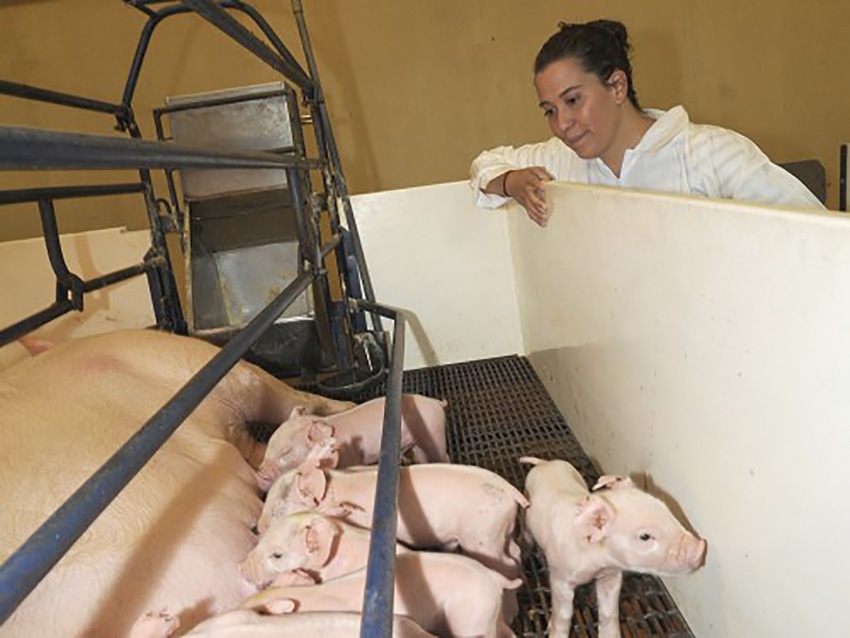OSU professor demonstrates animal welfare compassion
“It’s important for us to view animal welfare on many levels, such as ensuring the animal is healthy, has good nutrition and has the ability to express natural behavior.” — Monique Pairis-Garcia
September 14, 2018

Source: Ohio State University College of Food, Agricultural and Environmental Sciences
Monique Pairis-Garcia fully understands the importance of strict adherence to good animal welfare on U.S. livestock farms, and the correlation to a producer’s efficiency.
Pairis-Garcia, a veterinarian and assistant professor of animal sciences in the College of Food, Agricultural, and Environmental Sciences at The Ohio State University, has made a career of focusing on animal welfare and has recently been named a Diplomate of the American College of Animal Welfare, the only swine veterinarian in Ohio to earn such a designation.
In fact, Pairis-Garcia, who is also an animal welfare specialist with OSU Extension, is the first veterinarian at Ohio State to earn board certification in this relatively new veterinary specialty. OSU Extension is the outreach arm of CFAES.
The designation means that Pairis-Garcia can demonstrate detailed knowledge of and special competence in animal welfare across all species. This is significant, considering that the American Veterinary Medical Association identified animal welfare in June 2006 as “one of the top five critical issues affecting the veterinary profession both in the United States and globally.”
“My entire career has been focused on animal welfare and behavior, so I’m very proud and excited to bring this honor to Ohio State, CFAES and the Department of Animal Sciences,” Pairis-Garcia says. “I think this designation means a lot to the field of animal welfare science and the impact it will have on the farm.”
Pairis-Garcia earned her doctor of veterinary medicine degree and a PhD in animal physiology from Iowa State University. She earned a scholarship from the American Association of Swine Veterinarians to take the exam for the board certification in animal welfare.
Her research at Ohio State focuses on animal welfare issues for livestock species including timely and humane euthanasia, on-farm welfare assessments and audits, and alternative management practices to improve animal welfare on-farm.
She also teaches CFAES undergraduate students and College of Veterinary Medicine veterinary students, focusing primarily on animal welfare and behavior in livestock industries.
In addition to teaching and conducting research, Pairis-Garcia serves as a consultant, working with livestock producers to improve animal welfare on farms, including swine, dairy and poultry farms.
For example, if an undercover video surfaces alleging suspected animal abuse or standards violations, Pairis-Garcia may be called to visit the farm to conduct an animal care audit. If violations are found, she works with producers to correct the animal care conditions.
Her new board certification in animal welfare demonstrates her expertise in the area, which is a key focus for producers in maintaining their social license to produce food, she says.
“I work to help producers provide an environment for their animals that optimizes their health and well-being,” Pairis-Garcia says. “When we recognize the role that animals have in our lives — whether it be the human-animal bond with pets or those relationships we have with livestock, it is our duty to take proper care of them when they are in our care.
“It’s important for us to view animal welfare on many levels, such as ensuring the animal is healthy, has good nutrition and has the ability to express natural behavior.”
Not only is it the right thing to do on a humane level, Pairis-Garcia says, but it’s also beneficial from a production standpoint — good animal welfare is key for quality food production.
“Consumers care about where their food is coming from and want quality,” she says. “When an animal is stressed, it will result in a decrease in the quality of the meat.”
To prevent that from happening, producers have to focus on proper animal handling, including remaining calm and quiet when they move animals, Pairis-Garcia says.
Pairis-Garcia says she plans to use her new animal welfare board designation to “have a better seat at the table to open up the lines of communications between producers and consumers and help people have a better understanding of the livestock industry.”
“As a veterinarian with this board certification,” she says, “I want to use this to improve the perception of the livestock industry and improve animal welfare on farm.”
You May Also Like



